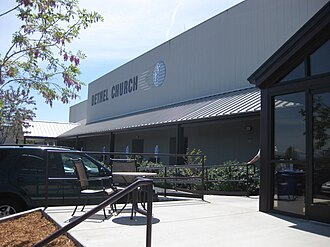
Kevin Rudd MP (Courtesy Wikipedia)
By Spencer D Gear
Kevin Rudd, Australian Prime Minister, is now in favour of homosexual marriage

I’ve been reading the article from Kevin Rudd’s homepage in which he indicates his change of mind regarding homosexual marriage, ‘Church and State are able to have different positions on same sex marriage‘ (20 May 2013). As expected, some of its content made it to today’s Courier-Mail, ‘Kevin Rudd declares his support for same sex marriage‘. My comments relate to the article on his homepage.
1. Rudd’s position refutes itself
His position is self-refuting, primarily because I expect that he wants me to engage in reading his article in its plain sense – literal interpretation – to understand what he exactly said and meant. But he disagrees with people who read the Bible literally. By the way, a literal reading of the text means that one takes into consideration all the figures of speech and symbols that are in that writing. It was Rudd who stated in his homepage article:
- ‘If we were today to adhere to a literalist rendition of the Christian scriptures, the 21st century would be a deeply troubling place, and the list of legitimized social oppressions would be disturbingly long’.
Then he proceeded to give examples of slavery in the USA, polygamy, and capital punishment by stoning for adultery. He doesn’t seem to have an understanding of biblical hermeneutics and the difference between Old and New Covenants in the Bible. See the article, ‘What about the Bible and slavery?‘
See my articles:
- ‘Isn’t it obvious what a literal interpretation of Scripture means?’;
- ‘Is the Bible to be interpreted as literal or metaphorical?’
2. My primary problems with Kevin Rudd’s conclusions
![]()
I see three core problems with Rudd’s changed approach to homosexuality:
1. The inconsistency in his method of interpretation. Can I presume that he wants me to read the article on his homepage literally so that I understand its content? Should I read the article literally that he have written for The Australian today, ‘A matter for the state, not church‘ (21 May 2013) so that I get the common, everyday meaning of what he wants to convey to me? When I pick up my local newspaper, an historical book, a geography book, a book on politics, or my Bible, should I interpret it literally, metaphorically or as a postmodern deconstructionist? The answer should be obvious. If I want to understand the plain meaning of the text, I read it literally and don’t impose any allegorical, metaphorical or postmodern deconstructionist meaning on it.
2. Kevin Rudd does not want us to take the same method of interpretation to the Bible. This is the hypocrisy of his position. It’s OK for Kevin Rudd to need a literal reading of his article on his homepage and in The Australian to understand his position, but it’s not OK to read the Bible literally.
3. He stated that he is a Christian but he doesn’t know his Bible very well. This especially relates to his statement, ‘I for one have never accepted the argument from some Christians that homosexuality is an abnormality. People do not choose to be gay’.
The apostle Paul disagrees with him profoundly in the inspired Scriptures. Which Bible has Kevin been reading? It is not the one that includes 1 Corinthians 6:9-11,
9 Or do you not know that wrongdoers will not inherit the kingdom of God? Do not be deceived: neither the sexually immoral nor idolaters nor adulterers nor men who have sex with men 10 nor thieves nor the greedy nor drunkards nor slanderers nor swindlers will inherit the kingdom of God. 11 And that is what some of you were. But you were washed, you were sanctified, you were justified in the name of the Lord Jesus Christ and by the Spirit of our God (NIV).
The Scriptures put homosexual behaviour in the same category as other sinful actions: heterosexual immorality, idolatry, adultery, theft, greed, drunkenness, slander, and swindling. And have a guess what? All these homosexual behaviours can be changed. The Scriptures state clearly, ‘That is what some of you were. But you were washed, you were sanctified, you were justified in name of the Lord Jesus Christ and by the Spirit of God‘. And that applies to homosexuals, male or female. Jesus changes all kinds of sinners.
Only this week (I’m writing on 21 May 2013), I have been in email contact with a redeemed lesbian whom I have known for 21 years, who has been wonderfully changed by the living Jesus and has no desire for a homosexual relationship and that has been her situation for the last 25 years. I don’t fall for Rudd’s line that people do not choose to be gay. God’s Word is clear that homosexuality is a sinful behaviour and when a person comes to Christ as Lord and Saviour for salvation, Jesus changes these people, including male and female homosexuals, from the inside out.
Kevin, it’s too late to tell me that homosexuals ‘do not choose to be gay’. They choose to be gay in the same sinful way that people choose to be heterosexually immoral, idolaters, adulterers, thieves, greedy, drunkards, slanderers and swindlers. It’s a sinful choice. However, all human beings are born with a propensity to sin. See the article, ‘Total depravity’, meaning comprehensive depravity of all human beings from conception.
Rudd stated on his homepage, ‘We have seen a range of social reforms over the decades where traditional, literalist biblical teachings have been turned on their head ‘. That social reforms have been changed does not repudiate a literalist interpretation, whether that is of Rudd’s article in The Australian, on his homepage, or in the Courier-Mail. It exposes the ‘social reforms’ for what they may be – a violation of God’s will.
3. Why literal interpretation is necessary

Rudd may accuse me of being a Bible literalist. This is what I am. I have been a committed evangelical Christian for the last 52 years and nowhere in the Bible can I read Rudd’s understanding of homosexuality. It is obvious that he is the one who is out of step with biblically accurate hermeneutics on the New Testament’s statements on the origin of homosexuality.
Rudd’s charge against literal interpretation of the Bible cannot be sustained. A literal interpretation is needed to understand what he writes. Then if he writes poetry, an allegory, a metaphor, a literal interpretation incorporates those views. This is how A Berkeley Mickelsen, expressed it in Interpreting the Bible,
“Literal” … means the customarily acknowledged meaning of an expression in its particular context. For example, when Christ declared that he was the door, the metaphorical meaning of “door” in that context would be obvious. Although metaphorical, this obvious meaning is included in the literal meaning (Mickelsen 1963:33).
4. Conclusion
I ask Kevin Rudd to reconsider these serious matters that challenge his changed position on homosexuality. His is not a biblical position. In addition, there are some serious consequences of a homosexual lifestyle. See the physical and sociological in my article, ‘Reasons to oppose homosexual marriage’. Here is an example from this article to conclude:
In Africa, ‘On average it is estimated that HIV infection rates amongst MSM (men who have sex with men) are four to five times higher than the population overall, with highs in certain areas’. [2]
The levels of promiscuity in the homosexual community also elevate the rates of sexually transmitted diseases (STDs).[3]
References
Mickelsen, A B 1963. Interpreting the Bible. Grand Rapids, Michigan: Wm. B. Eerdmans Publishing Company.
Notes
[1] Much of the content of this post I sent in an email to Kevin Rudd on 21 May 2013. I have made some additions and changed from second to third person in speaking about Kevin Rudd.
[2] Africa.gm, July 25, 2008. Available at: AFRICA: Homophobia fuelling the spread of HIV (Accessed 21 May 2013).
[3] See this summary report, ‘The health risks of gay sex’, by John R. Diggs Jr. M.D.
Copyright © 2013 Spencer D. Gear. This document last updated at Date: 29 October 2015.
![]()














